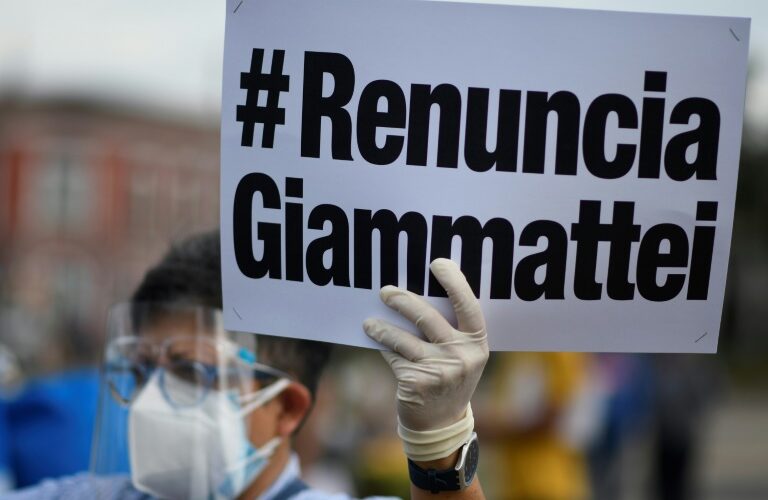Photo: hispanospress.com
Widespread protests continued this week, calling for the resignation of President Giammettei and Attorney General Consuelo Porras. The Plurinational Strike began in July and has gained momentum in the last few weeks.
On August 13, protesters marched to the Presidential Palace, giving the president and attorney general five days to step down. As the deadline passed and their demands were not met, indigenous authorities and popular social movements released a joint statement announcing plans to continue the strike on August 19 and 20 and calling others to “join the demonstrations of protest and pacific resistance enshrined in Article 45 of the Constitution of the Republic of Guatemala.”
Giammettei responded by going on the defensive, blaming protesters for the most recent surge in COVID. Having declared a state of prevention on July 13 for fifteen days, limiting freedom of movement and banning unauthorized protests, President Giammattei in August announced a state of calamity, to last from August 14 to September 11. Apparently aimed at preventing the spread of COVID, one of the measures imposed prevents protests without prior notification.
By law the state of calamity should have been approved by Congress within three days of its declaration but was not, leading many to consider the state of calamity illegal and not in effect. On August 19, National Police fired teargas at protesters in Jupilingo, Camotán, Chiquimula, and apparent counter-protesters armed with sticks threatened demonstrators in Guatemala City. Despite these threats, protesters continued the strike into Friday.

Constitutional Court Blocks Swearing in of Gloria Porras
In the continuing attack on the independence of the judiciary, the Consitutional Court unanimously ruled to grant an injunction filed by the Foundation Against Terrorism and lawyer Juan José Sandoval Saucedo. The injunction orders Congress to abstain from swearing in Constitutional Court Judge Gloria Porras as Titular Magistrate. Porras has been on the Constitutional Court for ten years and had served as president since 2020.
She is known for taking anti-corruption and pro-human rights positions. In March of this past year she was elected by the Higher University Council, but her confirmation was blocked by Congress on April 13. Porras was forced to flee Guatemala and has joined other exiled prosecutors and jurists in the US as challenges to this decision continue.
Human rights organizations condemned the Court’s decision, viewing it as the latest step in a series of attacks to remove independent judges from their posts. The Convergence for Human Rights in a statement expressed fear for the future of rule of law in Guatemala: “The institutions are under the control of mafia networks with the political, economic, and criminal power to decide in a whimsical and convenient fashion to preserve the current system.” This week’s decision by the Constitutional Court effectively blocks the swearing in of Porras and deals yet another blow to the campaign against impunity and corruption in Guatemala.
Ombudsman’s Office Protests Outside of Congress
On August 18, the Human Rights Ombudsman, Jordan Rodas, led a protest outside of the Guatemalan Congress to demand that the budget for the Ombudsman’s Office be delivered. Congress has refused to hand over the Q20 million allotted in the budget to the office. Now, after six months, the office has run out of the funding it needs to be able to perform its vital human rights work. As Rodas has pointed out, Congress is required to release the funds and was ordered to do so by the Constitutional Court last February.
Migrants Forced Back to Guatemalan Border
Meanwhile, Guatemalan and other Central American migrants expelled by the US and flown to the south of Mexico have been forced back into Guatemala by the Mexican government. Citing new threats from the delta variant and record numbers of migrants at the southern border, the US resumed expulsion flights to Mexico under Public Health Authority: Title 42.
Upon arrival in Mexico, Central American migrants are being loaded onto buses by Mexican authorities and dropped across the Guatemalan border into the remote towns of El Caibo and El Carmen. Guatemalan Migration Authorities have admitted to working with Mexico to accept expelled migrants, but migrants are receiving little to no assistance once they arrive.
Migrants report that they were never given credible fear interviews at the US border nor the chance to apply for asylum in Mexico before being transported back to Guatemala; both are violations of international refugee law, according to UN High Commissioner for Refugees, Matthew Reynolds.
In a statement he explained, “Individuals or families aboard those flights who may have urgent protection needs risk being sent back to the very dangers they have fled in their countries of origin in Central America without any opportunity to have those needs assessed and addressed.”
Natalia Lorenzo, of the Ombudsman Office in Petén expressed concern, explaining the pre-existing capacity issues in the region. Dumping migrants into a country facing its own corruption tailspin is more than a violation of international law, she notes. As she puts it, “It’s abusive.”




